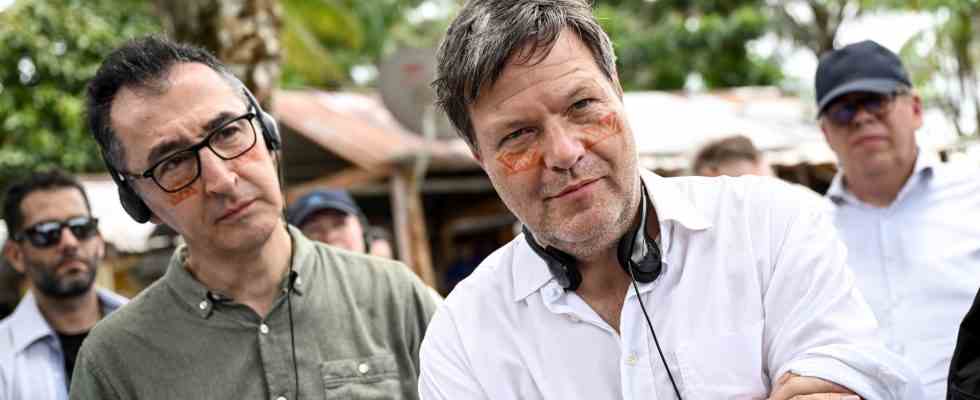analysis
Status: 03/15/2023 07:59 a.m
Two Green Ministers of the federal government are each visiting the Brazilian rainforest, which is so important for the global climate, for the first time. The fact that the two are working hard in South America is not just due to climate protection.
Robert Habeck is only second. First, Cem Özdemir gets his make-up done. Small red decorations under both eyes. A welcome gesture for the two German ministers in an indigenous village in the Brazilian rainforest.
“I am Robert and this is Cem,” Habeck greets the hosts, including many children, from whom the climate protection minister wants to learn how to live in the rainforest and protect it at the same time.
Özdemir, who is responsible for forest protection in the federal government, adds that “we” are responsible for ensuring that people can continue to live in the Amazon region in the future. He gets applause. The German ministers – figuratively – donated it to the Brazilian government under President Luiz Inácio Lula da Silva on the two days before the trip.
During a visit to Brazil, Federal Minister of Economics and Vice Chancellor Robert Habeck has a sign painted on it that is intended to serve as protection.
Image: dpa
Habeck and Özdemir believe him and his ministers are serious about protecting the Amazon after years under predecessor Jair Bolsonaro that endangered the rainforest.
In February, more trees were cut down than seldom. But deforestation is to be banned by 2030, which is what Özdemir emphasizes, as well as Lula and Marina Silva in particular – the environment minister who Habeck wanted to meet the day before his visit to the rainforest, but then canceled because he was seriously ill.
Germany can hope for green hydrogen
However, Habeck’s meeting with Brazil’s Energy Minister Alexandre Silveira did take place on Monday. He then spoke of a spontaneous friendship and an effective meeting – which sounded a bit like he would have liked to talk to Habeck longer.
On the other hand, there was really nothing to argue about: The German energy minister is happy about Brazil’s wind boom and hopes for green – i.e. climate-neutrally produced – hydrogen, of which Germany will have to import a multiple of what it needs. Silveira assumes that Brazil will produce surpluses, meaning it will be able to deliver – including to Germany.
In general, harmony, appreciation and the expression of common interests know practically no limits during Habeck’s visit to South America. The minister repeatedly praised the efforts of the hosts to protect the climate. Habeck and Özdemir, who are traveling with them, are thus continuing the German charm offensive that the Federal President and Chancellor had recently begun.
Germany is courting Brazil as an ally
After all, energy policy and climate protection are only part of the bigger picture: South America is of geostrategic importance for Germany. The awareness of thinking more in alliances has grown since the Russian war against Ukraine at the latest – and it’s also about not letting China and its highly subsidized economy take precedence all over the world.
The free trade agreement with the South American confederation of states Mercosur, which has been negotiated for a long time but has not come into force, is just right for Germany and the EU. Here, too, there was great agreement that the agreement should be concluded this year with additional points.
Here, too, Habeck is letting the charm play: Will allow the South Americans not to remove all the hurdles for EU companies when investing on the partner continent, so that the domestic companies don’t go bust because of too much European competition. It should be a “friendly” trade agreement, Habeck says.
Mercosur agreement has strong opponents
Some of the opponents of the Mercosur agreement come from the vicinity of the minister and his party: environmental groups doubt the promises to protect the rainforest and expect more meat exports to Europe. The farmers’ association sees it that way in a rare alliance. Mercosur is unfairly competing with European farmers, including with meat produced under less stringent animal welfare standards than European ones. This is exactly why France and Austria are at least critical of Mercosur.
Habeck and Özdemir counter this criticism by saying that at some point China will decide where to go. They do not want to have heard the pessimism of many Germans about free trade agreements in Brazil, on the contrary: there they are convinced that trade agreements do not torpedo climate protection, but improve it.
Clean energy from the coal country of Colombia
Habeck is also looking for cooperation in Colombia. He arrived there at the end of his trip to South America. The meetings at ministerial level are still pending, but Habeck made it clear the evening before: Colombia also has strong prerequisites for exporting hydrogen from wind power – and Germany has the chance to get something from it.
However, Colombia is still primarily a coal country, and after Russia’s attack on Ukraine, Germany also replaced Russian hard coal with Colombian hard coal. Germany and Colombia also have to get out of coal together.

